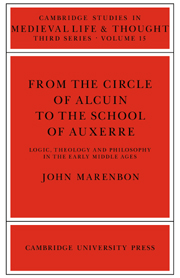 From the Circle of Alcuin to the School of Auxerre
From the Circle of Alcuin to the School of Auxerre Published online by Cambridge University Press: 24 October 2009
Many a reader will doubtless dissent from some of the arguments I have advanced, and disagree with some of the interpretations I have given. But no one, I hope, who has read these pages will think that the early medieval period was the philosophical desert, watered by the fewest oases, which some historians have portrayed. At the courts of Charlemagne and Charles the Bald, and in the monasteries of Corbie and Auxerre, men of the early Middle Ages made their first attempts to grapple with abstract problems by the exercise of reason. I have presented evidence to suggest that philosophy is a term which can properly be used of some part of these thinkers’ activity. The imposition of theological interests on logical texts led them to ask questions about the fundamental constitution of reality, and to give answers which were consistent with Christian dogma but not in any simple way derived from it.
The period of philosophy I have studied is thus one of beginnings. It is characterized not by the perfected clarity of its arguments, nor by the coherence of its systems, but rather by a tentativeness in reasoning that can approach dullness, or alternatively, by a premature brilliance which often conceals deep intellectual confusion. Moreover, much of the substance of early medieval philosophy lay in a tradition of teaching, learning and discussion in schools and monasteries: the evidence for this tradition is various in kind, and requires extensive analysis before it may be fully interpreted.
To save this book to your Kindle, first ensure [email protected] is added to your Approved Personal Document E-mail List under your Personal Document Settings on the Manage Your Content and Devices page of your Amazon account. Then enter the ‘name’ part of your Kindle email address below. Find out more about saving to your Kindle.
Note you can select to save to either the @free.kindle.com or @kindle.com variations. ‘@free.kindle.com’ emails are free but can only be saved to your device when it is connected to wi-fi. ‘@kindle.com’ emails can be delivered even when you are not connected to wi-fi, but note that service fees apply.
Find out more about the Kindle Personal Document Service.
To save content items to your account, please confirm that you agree to abide by our usage policies. If this is the first time you use this feature, you will be asked to authorise Cambridge Core to connect with your account. Find out more about saving content to Dropbox.
To save content items to your account, please confirm that you agree to abide by our usage policies. If this is the first time you use this feature, you will be asked to authorise Cambridge Core to connect with your account. Find out more about saving content to Google Drive.